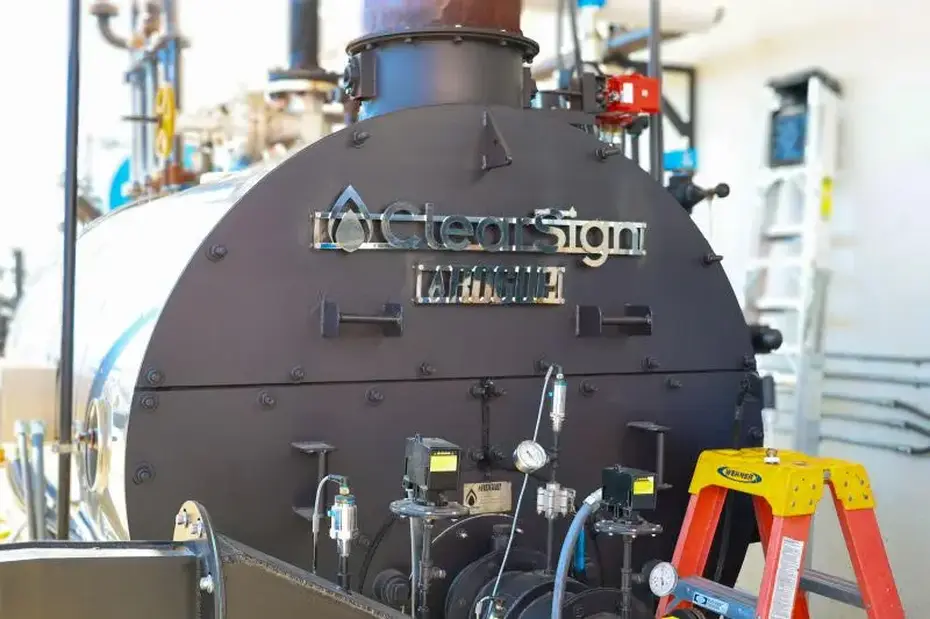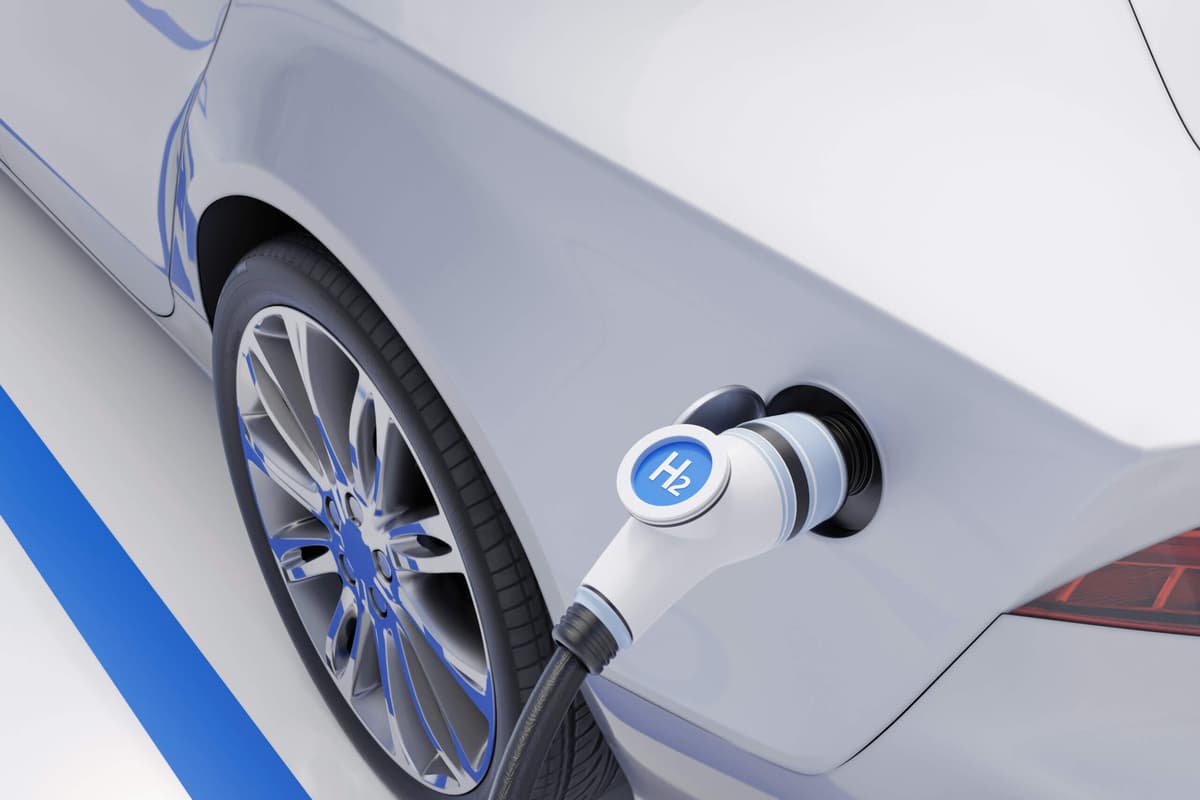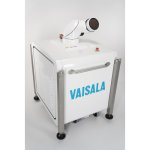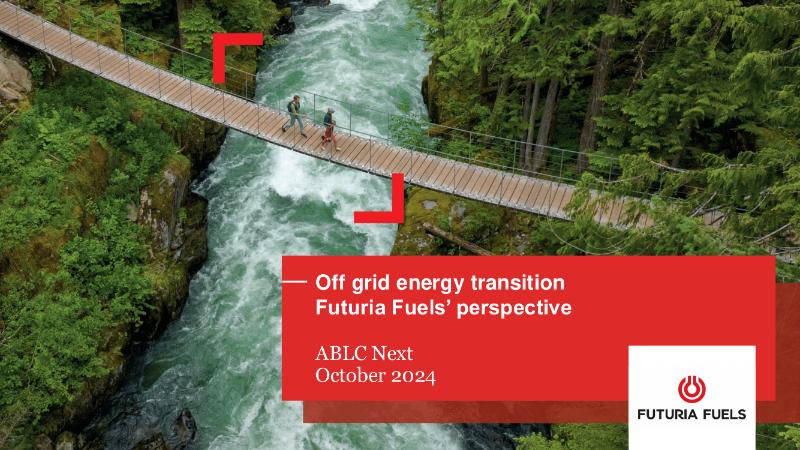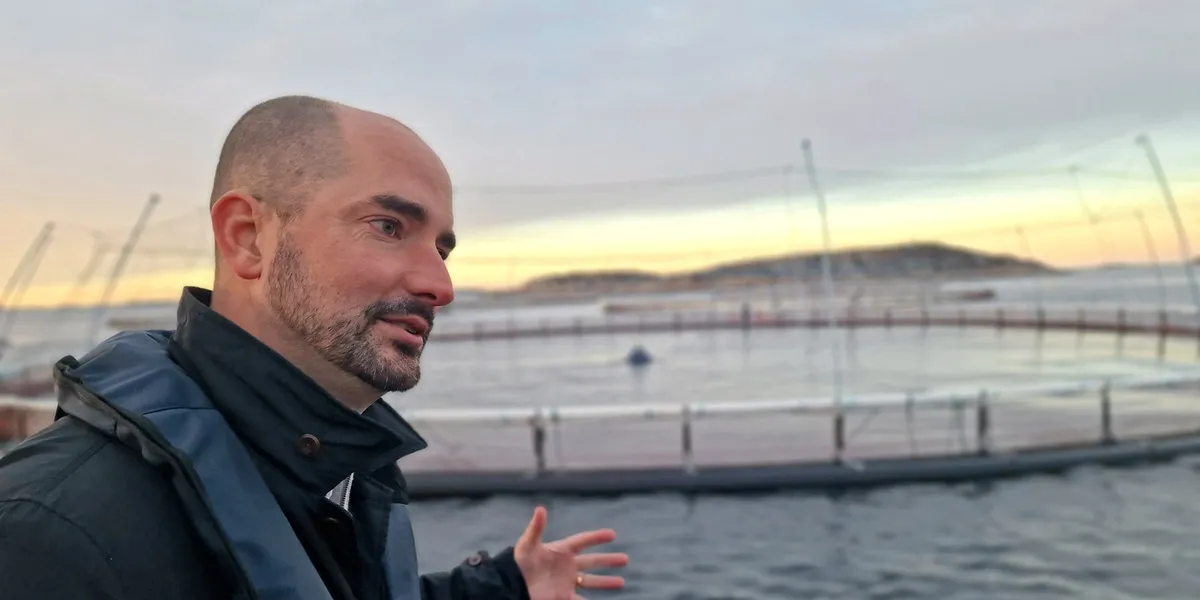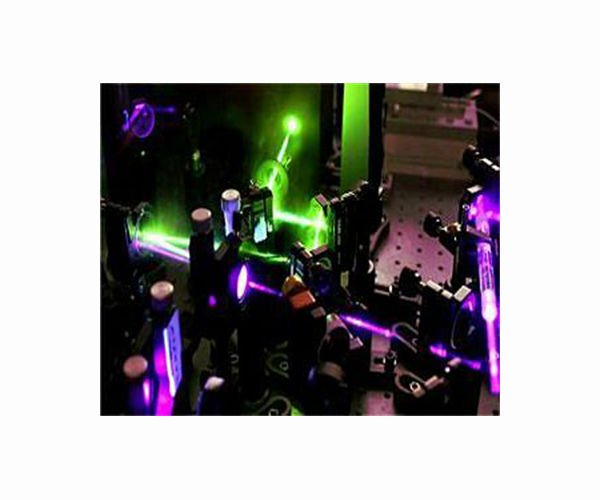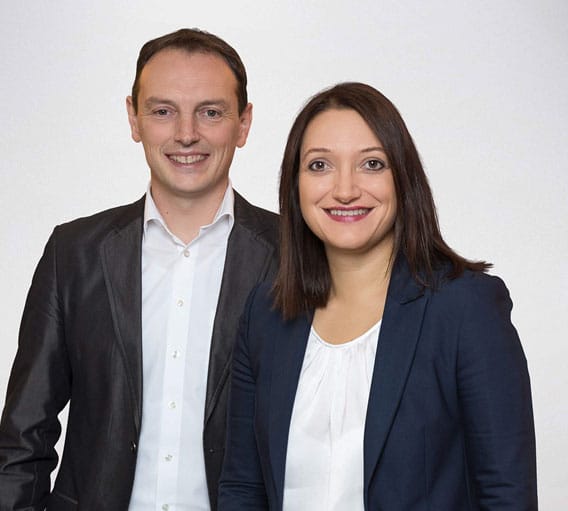
Interview with Carmen and Gerd Junker, Grünes Geld GmbH
The current economic uncertainty is also leaving its mark on the hydrogen sector. The long-awaited ramp-up in the production of electrolyzers and fuel cell trucks, and the production of green hydrogen, is still a long time coming. The reaction on the stock exchanges is correspondingly subdued. After the look at the H2 economy by analyst Max Deml in the previous H2-international issue, today we’re asking Carmen and Gerd Junker, founders of Grünes Geld GmbH, for their perspective on the H2 market.
Sven Geitmann H2-international: Dear Mrs. Junker, You and your husband and business partner have been managing your own hydrogen fund for four years now. You are a trained business administrator and business psychologist, and you already managed your own savings bank branch at the age of 22. How did you get into the topic of hydrogen?
Carmen Junker: In 2001, I founded my independent financial advisory company, which I converted six years later into Grünes Geld GmbH. Since 2007, we’ve dedicated ourselves with great passion to the area of ethical-ecological financial investments, where we particularly specialize in the cleantech sector. We recognized early on the central importance of hydrogen as an indispensable element for energy storage.
In discussions with our clients, it became increasingly clear that an essential solution for storing renewable energies over longer periods of time is needed – especially in times when there is neither enough sun nor wind available. While battery technologies continued to evolve, it became clear to us as early as the end of 2018 that hydrogen was the only viable solution for industry and long-term energy storage. However, there was a lack of corresponding investment opportunities at the market, which is why we used our extensive expertise in asset management to develop our own risk-spread and legally secure investment product. The road to realization was a little longer than expected, but finally on December 15, 2020, we were able to launch GG Wasserstoff, the first hydrogen equity fund in Germany and Austria.
Sven Geitmann H2-international: Dear Mr. Junker, You have as a qualified engineer in electrical engineering and industrial engineering a technical background and have years of management experience in a medium-sized stock corporation. What motivated you to shift the thematic focus of your company, founded in 2007, more towards hydrogen?
Gerd Junker: The question of storage technologies has always existed in the area of renewable energies; after all, in addition to the base-load energies such as geothermal energy, bioenergy and hydropower, wind power and photovoltaics are also intermittent. For many years, the discussion has primarily revolved around battery storage; from the late 2010s, then also increasingly often around hydrogen. The gravimetric energy density is about 100 times higher, and that is exactly what is needed in many applications. Our clients asked about investments in this area, but there was practically nothing with a reasonable risk concept. Since we already had many years of experience in asset management, the launch of GG Wasserstoff as the first and still only German hydrogen fund was a logical consequence.
Mrs. Junker, can you please briefly explain to our readers what exactly you do?
Carmen Junker: GG Wasserstoff is a fully regulated investment fund that raises capital from investors. The fund (ISIN: A2QDR5) can be easily purchased via a securities account at savings banks, investment banks or online brokers. The company Grünes Geld Vermögensmanagement GmbH, which advises the fund with its expertise in the hydrogen sector, supports the official fund manager Hansainvest in selecting the 30 to 40 most promising shares of hydrogen companies worldwide. It is crucial for the security of investors that the experienced capital management company Hansainvest from Hamburg takes over the professional and legally compliant management of the fund. Our task at Grünes Geld Vermögensmanagement GmbH is to identify and recommend the soundest investment opportunities along the entire hydrogen value chain.
Sven Geitmann H2-international: So you combine the shares of various listed companies that are active in the hydrogen sector into one fund – the GG Wasserstoff fund. You differentiate between pure players and blended players in this. Please explain this distinction.
Carmen Junker: Pure players are companies that are practically exclusively dedicated to the topic of hydrogen. That can be electrolyzer manufacturers or fuel cell producers or everything you need in the field of hydrogen usage or its derivatives. These are usually smaller, younger companies with higher price fluctuations and high long-term growth potential. In soccer, these would be the forwards.
Blended players, on the other hand, deal in addition to the topic of hydrogen with other business areas. A typical example would be the company Linde, which is the world market leader in industrial hydrogen gas but also supplies many other gases and builds other industrial systems. These companies are usually larger and have a calmer share price performance, or, to stay with the soccer metaphor, these are the midfield and defense.
Sven Geitmann H2-international: How can potential investors participate in your fund?
Carmen Junker: : The fund GG Wasserstoff can easily be purchased through your advisor by asking them to include the fund in your securities account. If you use an online broker, you can buy the fund there directly, often at favorable conditions via exchanges such as Hamburg, Stuttgart, Gettex or Tradegate. For inexperienced investors, we offer detailed information on the purchase process as well as our contact details at the website www.wasserstofffonds.de. If you do not yet have a portfolio, the fund can also be obtained through Grünes Geld GmbH as intermediary. The fund can generally be purchased from an amount of EUR 500 or via a monthly savings plan, for example starting from EUR 100. A monthly savings plan makes use of the cost-average effect and makes it possible to buy cost-effective in the long term – therefore we particularly recommend this option.
Sven Geitmann H2-international: Mr. Junker, your fund has had a performance of ?48 percent since 2021. Can you explain how this development came about?
Gerd Junker: Whoever follows the column on hydrogen shares in the H2-international magazine has seen that hydrogen stocks peaked precisely in 2021 – an absolute exaggeration from today’s perspective. An incredible amount of money flowed into the small sector of hydrogen shares at the time, which led to exaggerated prices. Since then, pure players have mostly fallen by 90 to 95 percent, so significant price declines occurred, but the security concept with blended players worked well.
Reasons for the lower prices are, in addition to the considerable exaggeration in 2021, also the significantly delayed ramp-up of the hydrogen industry, which is only now slowly getting off the ground – partly because government funding commitments such as IPCEI were only made this year after a three-year delay or the American Inflation Reduction Act will probably only be concretely formulated after the elections. We join the head of Germany’s largest pure player, ThyssenKrupp Nucera, in stressing that the hydrogen ramp-up is delayed but is still expected to proceed as planned.
The third major stumbling block was the unprecedentedly rapid rise in interest rates around the year 2022. High interest rates simply make capital-intensive investments, such as those required to build up the hydrogen industry, very expensive. However, the European Central Bank already cut interest rates once in the summer, and this will certainly be followed by further interest rate cuts.
Sven Geitmann H2-international: How have you perceived the past few years, in which there was repeated talk about the imminent market entry of hydrogen and fuel cell technology, but that didn’t materialize?
Gerd Junker: One is the vision for the future and the good prospects – including the big promises of politics. For us as fund managers, however, the regularly reported business figures are the more important source, as they are more reliable. That is the unvarnished truth. Here, we would have expected a faster and more regular increase; pure players in particular are currently growing too slowly. In the fund, we are therefore overweighted with blended players.
Sven Geitmann H2-international: In one of your last webinars, you spoke about SAFs (sustainable aviation fuels), or green kerosene. How quickly do you see the development in this segment?
Gerd Junker: Let me introduce here for example the H2Global auction in July for sustainable kerosene. Unfortunately, the auction failed here, whereas the tender for green ammonia was very successful. Although a similarly large volume was put out to tender, there were no bidders at all. Money or will were not the problem at this point. That no bids were received was due to the strict regulatory framework imposed by the European Union. Bureaucracy and micromanagement are the biggest obstacles to the expansion of the hydrogen economy and SAFs. Unfortunately, we are not seeing any real acceleration in the European Union and are focusing on investments in other economic areas for this segment.
H2-international: Since January 2024, the fund has lost 15 percent, 5 percent in August alone. What was the trigger for these losses in August?
Carmen Junker: Now, at the time of this interview, August is only half over, so the August performance has not yet been determined. However, the sharp setback in August has little to do with hydrogen values, but rather with the general stock market turbulence, which was caused by the unwinding of the carry trade with money borrowed cheaply in Japan, which was then invested in equities in the strong dollar area. In such situations, all shares that are smaller, such as in the hydrogen sector, fall particularly sharply. The annual performance to date is due to the reasons already mentioned. If interest rates continue to fall and the hydrogen projects are finally implemented, this should quickly lead to rising share prices.
Sven Geitmann H2-international: What are you currently hearing from the business world? Is there still a certain amount of uncertainty and reluctance to invest, or is the situation already easing?
Gerd Junker: There is certainly a reluctance to invest, but the mood is more relaxed than you might think. We recently heard a manager at the Handelsblatt hydrogen summit say: Larger industrial projects typically take five to ten years to implement and are usually subject to delays of some kind. It is no different for hydrogen projects. We’ve simply reached reality.
Sven Geitmann H2-international: You write on your homepage that historical performance does not allow “any conclusions to be drawn about future performance.” What developments do you expect for the coming months?
Carmen Junker: For the coming months, you can hardly give any serious information on the stock exchange. In the very long term, equity markets worldwide will have between a six and nine percent yield. If hydrogen stocks start to catch up, you can add a bit more on top with this return plus.
Sven Geitmann H2-international: Please pick out three stocks that you think are particularly interesting at the moment.
Gerd Junker: By “currently considered particularly interesting,” we mean companies that we consider to have good prospects over the next few years – their shares may then also develop positively. But this is absolutely not an investment recommendation. Everyone who is on the stock market must make up their own mind.
Among the pure players, SFC Energy from Brunnthal near Munich would be interesting. They offer power supply solutions based on fuel cells. The profit zone was already reached there in 2022, the management is experienced and trustworthy, and the valuation is currently relatively low.
The English Ceres Power develops solid oxide fuel cells and electrolysis solutions, which it licenses to major players around the world. Without their own production, they can scale the model quicker. After many years of business development, the business figures are now also improving, and the valuation on the stock markets is attractive anyway.
Among the blended players, we like a Gaztransport & Technigaz SA from France. Their division Elogen builds PEM electrolyzers. These could be delivered in ready-made trailer solutions that can then be easily transported and operated anywhere in the world. Gaztransport & Technigaz SA also develops solutions for hydrogen transport by ships. The business figures are excellent and the valuation on the stock markets is favorable in our view.
Sven Geitmann H2-international: Last question: What distinguishes your fund from other financial products and indices?
Carmen Junker: First of all, it should be emphasized that GG Wasserstoff is the only German investment fund that focuses exclusively on the hydrogen segment. In comparison, other forms of investment, such as certificates, are less suitable for many investors due to the counterparty risk. Passive products are also not an optimal solution in a dynamic growth sector in which the financial markets are still pricing inefficiently. Our particular strength lies in the unique combination of our fund management: On the one hand, an experienced banker and stock market expert, on the other hand, an engineer. This expertise is invaluable for a technology fund.

